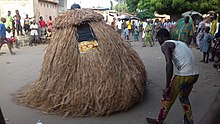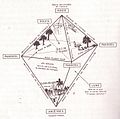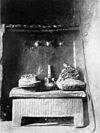Portal:Traditional African religions
Introduction The beliefs and practices of African people are highly diverse, including various ethnic religions. Generally, these traditions are oral rather than scriptural and are passed down from one generation to another through folk tales, songs, and festivals, and include beliefs in spirits and higher and lower gods, sometimes including a supreme being, as well as the veneration of the dead, and use of magic and traditional African medicine. Most religions can be described as animistic with various polytheistic and pantheistic aspects. The role of humanity is generally seen as one of harmonizing nature with the supernatural. (Full article...) Selected article'Haitian Vodou, known commonly as Voodoo is a syncretic religion practiced chiefly in Haiti and the Haitian diaspora. Practitioners are called "vodouists" Vodouists believe in a distant and unknowable Supreme Creator, Bondye (derived from the French term Bon Dieu, meaning "good God"). According to Vodouists, Bondye does not intercede in human affairs, and thus they direct their worship toward spirits subservient to Bondye, called loa. Every loa is responsible for a particular aspect of life, with the dynamic and changing personalities of each loa reflecting the many possibilities inherent to the aspects of life over which they preside. To navigate daily life, vodouists cultivate personal relationships with the loa through the presentation of offerings, the creation of personal altars and devotional objects, and participation in elaborate ceremonies of music, dance, and spirit possession. Vodou originated in what is now Benin and developed in the French colonial empire in the 18th century among West African peoples who were enslaved, when African religious practice was actively suppressed, and enslaved Africans were forced to convert to Christianity. Religious practices of contemporary Vodou are descended from, and closely related to, West African Vodun as practiced by the Fon and Ewe. Vodou also incorporates elements and symbolism from other African peoples including the Yoruba and Kongo; as well as Taíno religious beliefs, Roman Catholicism, and European spirituality including mysticism and other influences. Selected imagesFestivalsThere are several religious festivals found in the various Traditional African religions. Some of these are listed below next to their corresponding religion :
Selected biography
Sundiata Keita was a puissant prince and founder of the Mali Empire. The famous Malian ruler Mansa Musa, who made a pilgrimage to Mecca, was his great-nephew.
Written sources augment the Mande oral histories, with the Moroccan traveller Muhammad ibn Battúta (1304–1368) and the Tunisian historian Abu Zayd 'Abd al-Rahman ibn Muhammad ibn Khaldun al-Hadrami (1332–1406) both having travelled to Mali in the century after Sundiata’s death, and providing independent verification of his existence. The semi-historical but legendary Epic of Sundiata by the Malinké/Maninka people centers on his life. The epic poem is primarily known through oral tradition, transmitted by generations of Maninka griots. Selected quote
Ram Swarup quoted in Koenraad Elst (2002) Source: Swarup, Ram [in] Elst, Koenraad, Who is a Hindu? : Hindu Revivalist Views of Animism, Buddhism, Sikhism, and Other Offshoots of Hinduism, Voice of India (2002), p. 72, ISBN 9788185990743
Did you know
Related portalsTopicsFor more Traditional African religion topics, see Category:Traditional African religions.
CategoriesWikiProjectsThings you can doAssociated WikimediaThe following Wikimedia Foundation sister projects provide more on this subject:
Discover Wikipedia using portals |






































